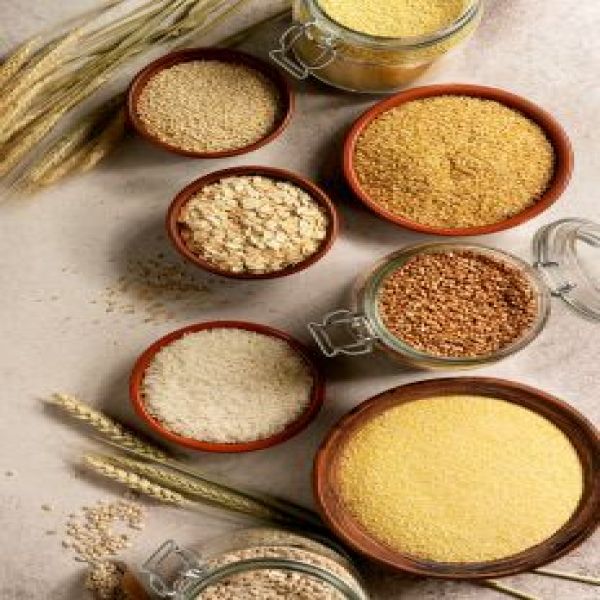Carbohydrates- Health benefits of wholegrains
What are healthy carbohydrates ?How do whole grain carbohydrates help your health?
updated on:2025-06-25 07:25:43
Written by Dr. Sanjana V.B Bhms,dbrm,cdn
Founder & medical director of siahmsr wellness.in
All rights reserved with siahmsr digital healthcare[siahmsr wellness]
Reviewed by SIAHMSR medical team.
Carbohydrates
Different types of carbs and how do they help your body
Carbohydrates are sugars that provide energy for all the cells and tissues of your body. Carbohydrates are present in most of your food and drinks and provide you energy. There are two different types of carbohydrates: simple and complex.
Sugars such as glucose is simple form of carbohydrate which is the main source of energy for human body. Fruit sugars are also simple sugars. Glucose also can be stored as glycogen in liver and muscle or, they can be converted to body fat.
Complex sugars include starch and fibers. Starch is usually present in cereals ,pasta , potaoes, peas and corn. Starch is divided into simple sugar during digestive processes within the body.
Fibers are complex healthy carbohydrates which are difficult to breakdown and helps to prevent constipation.
Diets rich in fiber reduce the risk of coronary heart disease, diabetes, obesity, and other chronic diseases.
Of late fibers are considered separately as an essential nutrient and not discussed under carbohydrates due to their significant role in health .
The energy value of digestible carbohydrates is generally accepted as 4 kcal/g for both sugars and starches.
Why carbohydrates are important for your health?
Carbohydrates are essential for proper functioning of:
· immune system
· brain and nervous system
· provide energy to perform tasks
· digestive system.
Sources of carbohydrates:
· brown rice
· vegetables
· Whole grain, pasta, bread etc.
· oatmeal
· fruits
· barley
. legumes
Carbohydrates are a major fuel or energy source for all cells of the body ,& certain cells such as cells of the central nervous system and red blood cells, rely solely on carbohydrates for energy.
Fruits, such as apples, bananas, berries, mangoes, melons, and oranges, dairy products, legumes, cakes, cookies, candy, and other desserts, Juices, regular sodas, fruit drinks, sports drinks, and energy drinks also contain sugar.
All types of carbohydrates are not good for your health. Certain types of carbs or sugars may risk your health. Overly processed products that contain bleached, white flour, refined sugars and foods with added sugars should be avoided from your diet.
What are healthy carbohydrates?
While choosing grains, select whole grains only; not refined grains. Whole grains are foods like whole wheat bread, brown rice, whole cornmeal, and oatmeal. They provide many nutrients that your body needs, like vitamins, minerals, and fiber along with carbohydrates.
Sources of whole grains
The major sources include:
· Cereals
· Wheat
· Rice (Black rice, brown, red, and
other colored rice varieties)
· Barley (hulled and dehulled but not
pearl)
· Maize or Corn
· Rye
· Oats (including hull-less or naked
oats)
Minor cereals
· Millets
· Sorghum
· Teff
· Triticale
· Canary grass
How do whole grain carbohydrates help your health?
Grains, such as bread, pasta, crackers, cereals, and rice &Starchy vegetables, such as potatoes, corn, and peas contain carbohydrates.
All whole grains contain three parts: the bran, germ, and endosperm. Each part contains health providing nutrients.
The bran is the fiber -rich outer layer that
supplies B vitamins, zinc magnesium , copper, antioxidants and phytochemicals.
The
germ is the core of the seed where growth occurs; it is rich in healthy fats,
vitamin E, B vitamins, phytochemicals, and antioxidants.
The endosperm is the interior layer that holds carbohydrates, protein, and small amounts of some B vitamins and minerals.
Health benefits of wholegrain carbs
The 2015-2020 Dietary Guidelines for Americans recommends eating 6 ounces of grain foods daily (based on a 2000-calorie diet) and getting at least half or 3 ounces of that grain intake from 100% whole grains.
Research studies show that whole grain consuming community had a 22% lower risk of total mortality, a 23% lower risk of cardiovascular disease mortality, and a 20% lower risk of cancer mortality.
whole grains reduce the risk of heart attacks, stroke and obesity linked other lifestyle diseases. Moderate consumption of whole grain variety of carbohydrates is highly beneficial in maintaining health.
Whole grains considerably lowers total cholesterol, low-density lipoprotein (LDL, or bad) cholesterol, triglycerides, and insulin levels and protects the heart and blood vessels preventing clot formation.
The American Institute for Cancer Research and World Cancer Research Fund International points out that research studies reveal strong evidence that whole grains decrease risk of colorectal cancer.
How much carbohydrates need to be included in your diet?
There is no fixed amount of carbohydrates to recommend to all. It varies according to age, sex, work load or activity levels, condition of health etc. It is suggestible that around 45%-65% of your calories should come from carbohydrates.
Daily Value for total carbohydrates is 275 g per day. This is based on a 2,000-calorie daily diet.
FOR EXTRA READING
Pros and cons of low carb diet
“Low carb diet” is
chosen by people for tackling various problems such as overweight, obesity, diabetes,
PCOS or polycystic ovarian syndrome, and for preventing cardiovascular
diseases, type 2 diabetes and cancer
http://siahmsrwellness.in/pros-and-cons-of-low-carb-diet
written by dr sanjana vb [copyright]
References
1.https://www.hsph.harvard.edu/nutritionsource/what-should-you-eat/whole-grains/#:~:text=Eating%20whole%20instead%20of%20refined,%2C%20triglycerides%2C%20and%20insulin%20levels.&text=Replacing%20refined%20grains%20with%20whole,reduce%20type%202%20diabetes%20risk.
2. https://medlineplus.gov/carbohydrates.html
3.https://www.ncbi.nlm.nih.gov/pmc/articles/PMC4224210/


Recommended For You
Carbohydrates- Health benefits of wholegrains
What are healthy carbohydrates ?How do whole grain carbohydrates help your health?
Related Links

sdfgh
